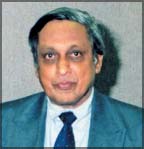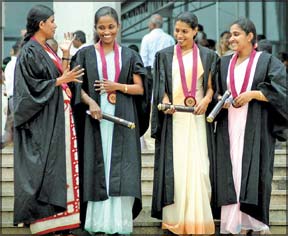|
Internal governance of the universities in Sri Lanka
- Part II:
Role of University Grants Commission
 Text of speech delivered by Higher Education
Minister Prof. Wiswa Warnapala at the Conference of Vice Chancellors in
Wadduwa on August 28. First part was published yesterday. Text of speech delivered by Higher Education
Minister Prof. Wiswa Warnapala at the Conference of Vice Chancellors in
Wadduwa on August 28. First part was published yesterday.
Therefore, strangely enough, the existence of those representatives
in the Court of the University has contributed to University autonomy
rather than the reverse. In practice, the powers of the Court were
purely formal, and it met once a year to review the financial account.
With few exceptions, the academic membership of the Court was almost
entirely confined to Deans and Professors. In this kind of set up, the
executive governing body was the Council, a body very much smaller in
size and responsible, under the supervision of the Court, to finance and
external relations.
It enjoyed the final authority in making academic appointments. It,
then as today, consisted of representatives of the academic staff, again
mainly Deans and Professors and members appointed by the Court - which
function is now in the hands of the University Grants Commission.
In Britain, nearly three-quarters of the Council were non-academic,
and the Council, which has become powerful in the absence of the
University Court, is predominantly academic, and the few non-academic
members, who come as eminent men with experience in various professions,
do not dominate the Council, and they, in the end, became an appendage
of the Vice Chancellor.
The University Court functioned as an institution till it was
abolished in 1982, and the Council was given the right to nominate three
persons, from whom the Head of State was able to pick a person for the
post of Vice Chancellor. This, in fact, is the current procedure adopted
for the purpose of appointing the Vice Chancellor. With the
establishment of a number of Universities, this type of change was
necessary as the University Court system was acceptable only in the
context of the single unitary University which functioned in the period
1942-1962.
|

Job-oriented higher education will minimize the unemployment
problem. ANCL library photo |
The Council, in the present context, is the effective governing body,
and it can make regulations. In the existing structure of governance,
the Vice Chancellor is the most important official of the University who
enjoys power in respect of both policy-making and administration. He has
to make decisions individually and collectively.
Most of the decision-making lies with the Council which is headed by
the Vice Chancellor who, as the chief executive officer, is responsible
for all the decisions. In fact, there are two processes with which the
Vice Chancellor is associated with - they are the policy-making process
and the administrative process. Therefore success of a Vice Chancellor
depends on a variety of factors, and most of the pressures come via
extraneous sources which are linked to students violence and stoppage of
work by the students - I mean the boycott of lectures.
Therefore the major administrative problems are associated with
disruptive tendencies among the undergraduate community, part of which
is politically mobilized, to de-stabilize the University and thereby to
disrupt the academic program of the University and also paralyze the
academic administration within the University.
This, in the last several decades, has become the major challenge -
or the major test - for a Vice Chancellor in running the University
administration and maintaining the academic life of the University.
As in Britain, Sri Lanka has the Committee of Vice Chancellors and
Directors -CVCD- and this Committee, which has been recognized by the
Universities Act of 1978, has an advisory role, and its meetings could
be used to discuss matters common to all the Universities in the
country. It needs to be mentioned that the role of the CVCD is
fundamentally advisory, and this role has been assigned to it by the Act
of 1978.
In Britain, the Vice Chancellors Committee was preceded by the Bureau
of the Universities of the Empire, and the Committee of Vice Chancellors
came into being in 1918. The process began in 1887 and the purpose was
to take counsel on matters relating to University grants and it was in
1911 that the Universities discussed the need for effective machinery
for joint action. In its early days, it functioned as a hesitant body
and it met four times a year. With the creation of the Vice Chancellors
Committee, the ad hoc business conference of Universities came to an
end.
On the basis of this evolution, three institutions became the
principal organs of government in a University, and they are the
University Court, the Council and the Senate. The Court, where it
functioned, was supreme and the Council was responsible to court and
Senate was subordinate to Council. Institutionally, those are the formal
relationships but the distribution of effective power and
responsibility, as you all know through experience, is very different.
In our earlier system, though the Court was supreme, nearly all its
powers were delegated to the Council as a working body and it functioned
as the effective decision-making centre.
In this way, the Council began to enjoy a comprehensive set of
powers, and the principal piece of legislation or statutes explicitly
empowered the Council to “review and control or disallow any Act of the
Senate and give directions to be obeyed by the Senate and review the
instruction and teaching of the University”. Any member or servant of
the University who is aggrieved could appeal to the Council and in the
Sri Lankan context, there is the University Services Appeals Board (USAB)
which has been given a central position with an appellate jurisdiction.
Some Vice Chancellors, through arrogance, with the assistance of the
Council, do not show much enthusiasm in respecting the decisions of the
USAB, which, in a way, are of judicial character. Its decisions are
binding on the University but they, probably basing their decisions on
academic freedom, challenge them in the Supreme Court and millions of
rupees are wasted on such cases.
To be continued |



